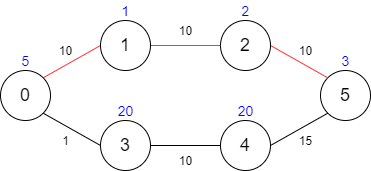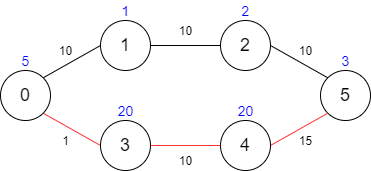| comments | difficulty | edit_url | rating | source | tags | |||
|---|---|---|---|---|---|---|---|---|
true |
Hard |
2413 |
Biweekly Contest 56 Q4 |
|
There is a country of n cities numbered from 0 to n - 1 where all the cities are connected by bi-directional roads. The roads are represented as a 2D integer array edges where edges[i] = [xi, yi, timei] denotes a road between cities xi and yi that takes timei minutes to travel. There may be multiple roads of differing travel times connecting the same two cities, but no road connects a city to itself.
Each time you pass through a city, you must pay a passing fee. This is represented as a 0-indexed integer array passingFees of length n where passingFees[j] is the amount of dollars you must pay when you pass through city j.
In the beginning, you are at city 0 and want to reach city n - 1 in maxTime minutes or less. The cost of your journey is the summation of passing fees for each city that you passed through at some moment of your journey (including the source and destination cities).
Given maxTime, edges, and passingFees, return the minimum cost to complete your journey, or -1 if you cannot complete it within maxTime minutes.
Example 1:
Input: maxTime = 30, edges = [[0,1,10],[1,2,10],[2,5,10],[0,3,1],[3,4,10],[4,5,15]], passingFees = [5,1,2,20,20,3] Output: 11 Explanation: The path to take is 0 -> 1 -> 2 -> 5, which takes 30 minutes and has $11 worth of passing fees.
Example 2:
Input: maxTime = 29, edges = [[0,1,10],[1,2,10],[2,5,10],[0,3,1],[3,4,10],[4,5,15]], passingFees = [5,1,2,20,20,3] Output: 48 Explanation: The path to take is 0 -> 3 -> 4 -> 5, which takes 26 minutes and has $48 worth of passing fees. You cannot take path 0 -> 1 -> 2 -> 5 since it would take too long.
Example 3:
Input: maxTime = 25, edges = [[0,1,10],[1,2,10],[2,5,10],[0,3,1],[3,4,10],[4,5,15]], passingFees = [5,1,2,20,20,3] Output: -1 Explanation: There is no way to reach city 5 from city 0 within 25 minutes.
Constraints:
1 <= maxTime <= 1000n == passingFees.length2 <= n <= 1000n - 1 <= edges.length <= 10000 <= xi, yi <= n - 11 <= timei <= 10001 <= passingFees[j] <= 1000- The graph may contain multiple edges between two nodes.
- The graph does not contain self loops.
We define
Next, within the time range
- Can first spend
$i - t$ minutes to reach city$y$ from city$0$ , then spend$t$ minutes to reach city$x$ from city$y$ , and add the passing fee to reach city$x$ , i.e.,$f[i][x] = \min(f[i][x], f[i - t][y] + \textit{passingFees}[x])$ ; - Can also first spend
$i - t$ minutes to reach city$x$ from city$0$ , then spend$t$ minutes to reach city$y$ from city$x$ , and add the passing fee to reach city$y$ , i.e.,$f[i][y] = \min(f[i][y], f[i - t][x] + \textit{passingFees}[y])$ .
The final answer is
The time complexity is
class Solution:
def minCost(
self, maxTime: int, edges: List[List[int]], passingFees: List[int]
) -> int:
m, n = maxTime, len(passingFees)
f = [[inf] * n for _ in range(m + 1)]
f[0][0] = passingFees[0]
for i in range(1, m + 1):
for x, y, t in edges:
if t <= i:
f[i][x] = min(f[i][x], f[i - t][y] + passingFees[x])
f[i][y] = min(f[i][y], f[i - t][x] + passingFees[y])
ans = min(f[i][n - 1] for i in range(m + 1))
return ans if ans < inf else -1class Solution {
public int minCost(int maxTime, int[][] edges, int[] passingFees) {
int m = maxTime, n = passingFees.length;
int[][] f = new int[m + 1][n];
final int inf = 1 << 30;
for (var g : f) {
Arrays.fill(g, inf);
}
f[0][0] = passingFees[0];
for (int i = 1; i <= m; ++i) {
for (var e : edges) {
int x = e[0], y = e[1], t = e[2];
if (t <= i) {
f[i][x] = Math.min(f[i][x], f[i - t][y] + passingFees[x]);
f[i][y] = Math.min(f[i][y], f[i - t][x] + passingFees[y]);
}
}
}
int ans = inf;
for (int i = 0; i <= m; ++i) {
ans = Math.min(ans, f[i][n - 1]);
}
return ans == inf ? -1 : ans;
}
}class Solution {
public:
int minCost(int maxTime, vector<vector<int>>& edges, vector<int>& passingFees) {
int m = maxTime, n = passingFees.size();
const int inf = 1 << 30;
vector<vector<int>> f(m + 1, vector<int>(n, inf));
f[0][0] = passingFees[0];
for (int i = 1; i <= m; ++i) {
for (const auto& e : edges) {
int x = e[0], y = e[1], t = e[2];
if (t <= i) {
f[i][x] = min(f[i][x], f[i - t][y] + passingFees[x]);
f[i][y] = min(f[i][y], f[i - t][x] + passingFees[y]);
}
}
}
int ans = inf;
for (int i = 1; i <= m; ++i) {
ans = min(ans, f[i][n - 1]);
}
return ans == inf ? -1 : ans;
}
};func minCost(maxTime int, edges [][]int, passingFees []int) int {
m, n := maxTime, len(passingFees)
f := make([][]int, m+1)
const inf int = 1 << 30
for i := range f {
f[i] = make([]int, n)
for j := range f[i] {
f[i][j] = inf
}
}
f[0][0] = passingFees[0]
for i := 1; i <= m; i++ {
for _, e := range edges {
x, y, t := e[0], e[1], e[2]
if t <= i {
f[i][x] = min(f[i][x], f[i-t][y]+passingFees[x])
f[i][y] = min(f[i][y], f[i-t][x]+passingFees[y])
}
}
}
ans := inf
for i := 1; i <= m; i++ {
ans = min(ans, f[i][n-1])
}
if ans == inf {
return -1
}
return ans
}function minCost(maxTime: number, edges: number[][], passingFees: number[]): number {
const [m, n] = [maxTime, passingFees.length];
const f: number[][] = Array.from({ length: m + 1 }, () => Array(n).fill(Infinity));
f[0][0] = passingFees[0];
for (let i = 1; i <= m; ++i) {
for (const [x, y, t] of edges) {
if (t <= i) {
f[i][x] = Math.min(f[i][x], f[i - t][y] + passingFees[x]);
f[i][y] = Math.min(f[i][y], f[i - t][x] + passingFees[y]);
}
}
}
let ans = Infinity;
for (let i = 1; i <= m; ++i) {
ans = Math.min(ans, f[i][n - 1]);
}
return ans === Infinity ? -1 : ans;
}
